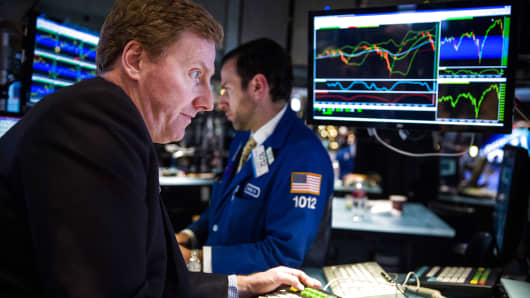A simple but elusive strategy has been beating the market this year: Just own what the hedge funds don’t.
Stocks with the lowest concentration in hedge fund portfolios as measured by equity capitalization have crushed the S&P 500 this year, according to a Goldman Sachs analysis. The “low-concentration” basket has turned in a basically flat performance that while unspectacular far outdistances the market index, which is down 6 percent year to date.
That means owning stocks such as Realty Income, Exxon Mobil, 3M andReynolds American, all of which have a comparatively low concentration in hedge fund portfolios, has been a better deal than holding Legg Mason, Autodesk, Williams Cos. and Tenet Healthcare, companies that are popular with managers.
Read MoreWhy hedge funds’ pain could be your gain
The latter group, or most concentrated stocks, has performed miserably, dropping about 10 percent year to date, according to Goldman.
Separately, a basket of 50 stocks composed of the companies that appear most often in hedge fund portfolios also has fared poorly, plunging 10 percent in a year that has made it tough for anyone to make money as the market swirls around recession fears and plunging energy prices. The top five stocks in this group are Allergan, Facebook,Alphabet, Time Warner Cable and Microsoft.
The results of the most-loved versus least-loved stocks in 2016 are not typical.
What Goldman calls its “VIP” list, or the one that includes the 50 most-owned stocks, has beaten the S&P 500 on a quarterly basis 64 percent of the time since 2001. The “high concentration” stocks that have lagged this year beat the S&P 500 68 percent of the time over the same period, while the “low concentration” basket “is typically a mediocre performer,” Goldman said.
Read MoreAnd the top-ranked hedge fund for 2015 is …
In the face of major turbulence in the broader market, the $2.9 trillion hedge fund industry, which has been underperforming the market for much of the post-financial crisis period, has proven to be at least a slightly better alternative. Of the 860 funds representing $1.8 trillion in assets that Goldman monitors, the average fund is down about 4 percent for 2016, compared to the 6 percent losses suffered by both the S&P 500 and the average mutual fund, according to Goldman.
Hedges have sharply cut their risk positions as the market has fallen, with the industry in total holding a 45 percent net long position, compared to the record high 57 percent in early 2015, and the lowest level since mid-2012.
[“source -pcworld”]

